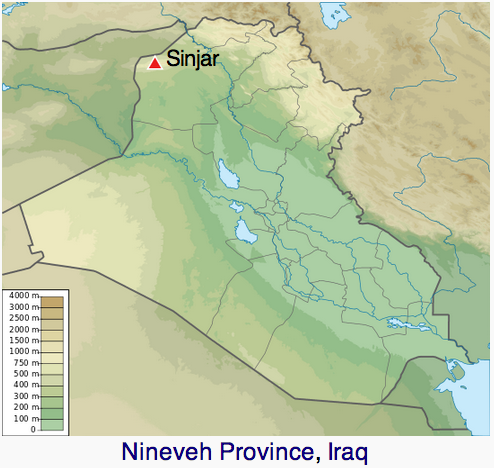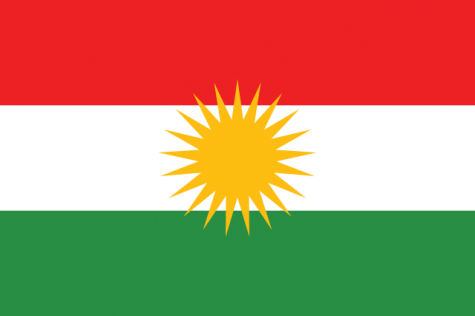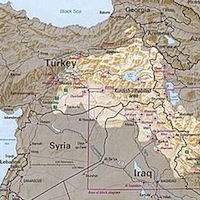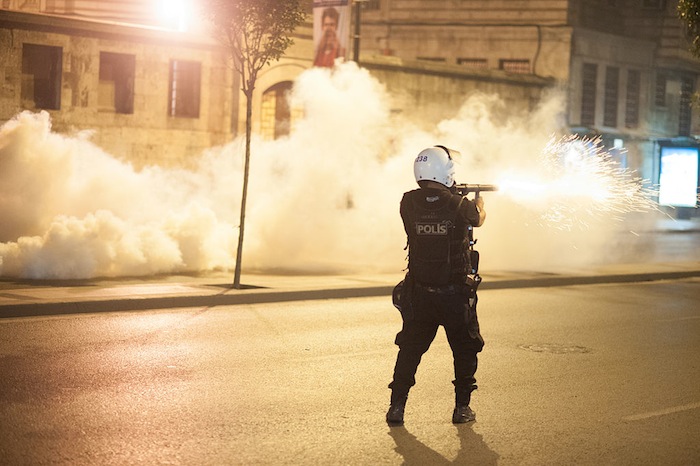In an effort likely aimed at rescuing 50,000 starving Yazidi Kurd civilians trapped by ISIS on Mount Sinjar, Kurdish commanders say the U.S. has started airstrikes tonight on ISIS positions, in coordination with Kurdish peshmerga troops. The mountain, which is a Yazidi holy site near the Syrian border, is outside the normal zone of control of the Kurdish Regional Government and is virtually surrounded by the forces of Islamic State (of Syria & Iraq), following the recent Kurdish retreats.
From the New York Times:
An announcement on Kurdish television of what was described as an American intervention prompted street celebrations and horn-honking by residents of towns under siege by the Islamic State in Iraq and Syria.
Anwar Haji Osman, deputy minister of the pesh merga, the Kurdish military force, said in the televised statement that his forces had been in contact with the Americans and that the bombings had been carried out by fighter jets.
Kurdish officials said the bombings had initially targeted ISIS fighters who had seized two towns, Gwer and Mahmour, near the main Kurdish city of Erbil. A top Iraqi official in Baghdad close to Prime Minister Nuri Kamal al-Maliki said that the Americans had consulted with the Iraqi government Thursday night about starting the campaign, the government had agreed and the bombing had begun.

Location of Mount Sinjar in northern Iraq. (Credit: Urutseg on Wikimedia)
The Pentagon is denying the reports of U.S. airstrikes there — though the Obama Administration has confirmed plans to drop food and supplies for the refugees — and tried to shift credit on to the Turkish military or Iraqi Air Force. While Turkey’s foreign minister did announce a food drop via helicopter, the government has denied conducting any airstrikes.
And although Iraq’s airforce has indeed been conducting airstrikes, they have already proven themselves far too incompetent to be responsible for the precision strikes near Sinjar. Iraqi airstrikes didn’t even make it past day 1 without indiscriminately obliterating big clusters of people who weren’t the intended target because the air force lacks the training — and desire — to be more careful or conscientious about their target selection. Killing 50 prisoners from your own side, while trying to liberate them by way of airstrikes, is not a smooth move.
The likeliest scenario is that this is a United States humanitarian intervention air campaign to try to rescue the Yazidis, a shrinking minority sect who have faced full-blown extermination campaigns by various factions more than 70 times in history. (Update, 8/8/14: The United States confirmed Friday morning that they had initiated airstrikes against ISIS missile launchers that were threatening Erbil, the capital of the Kurdish Regional Government. President Obama vowed to defend Erbil, a longtime U.S. ally city in northeastern Iraq, from any efforts by ISIS to move on it.)
In other news, the town of Qaraqosh also has fallen to ISIS and Christians are having to flee as the Kurdish Peshmerga troops fell back again. The town was one of the big centers of Iraq’s Christian populations. Earlier today, the UN claimed that the 50,000 trapped Yazidis were successfully and safely broken out, but US and most UK media outlets (following the lead of the US government) say they are still there. On another front, newly ISIS-aligned rebel forces in Syria struck at Lebanese military posts on the border, in retaliation for their failure to stop Hezbollah’s cross-border activities in support of the Syrian regime.






